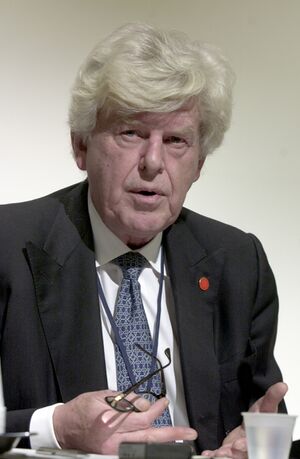Wim Duisenberg
(politician, central banker) | ||||||||||||||||||||||||||||||||||||||||
|---|---|---|---|---|---|---|---|---|---|---|---|---|---|---|---|---|---|---|---|---|---|---|---|---|---|---|---|---|---|---|---|---|---|---|---|---|---|---|---|---|
 | ||||||||||||||||||||||||||||||||||||||||
| Born | Willem Frederik Duisenberg 9 July 1935 Heerenveen, Netherlands | |||||||||||||||||||||||||||||||||||||||
| Died | 31 July 2005 (Age 70) Faucon, Vaucluse, France | |||||||||||||||||||||||||||||||||||||||
| Nationality | Dutch | |||||||||||||||||||||||||||||||||||||||
| Alma mater | University of Groningen | |||||||||||||||||||||||||||||||||||||||
| Children | • Pieter Duisenberg • daughter and one other son | |||||||||||||||||||||||||||||||||||||||
| Spouse | Tine Stelling | |||||||||||||||||||||||||||||||||||||||
| Member of | Bilderberg/Steering committee, Delors committee, Dutch Round Table | |||||||||||||||||||||||||||||||||||||||
| Party | Labour Party | |||||||||||||||||||||||||||||||||||||||
President of the European Central Bank, 7 Bilderbergs
| ||||||||||||||||||||||||||||||||||||||||
Willem Frederik "Wim" Duisenberg was a Dutch politician of the Labour Party (PvdA) and economist. In 1997, he became President of the European Monetary Institute, the forerunner of the European Central Bank, taking over from Bilderberger Alexandre Lamfalussy. In 1998 he was made the first President of the European Central Bank. In this capacity, he was one of the driving forces behind the introduction of the euro as a means of payment in 12 European countries on 1 January 2002. In 2003 he handed over to another Bilderberg Steering committee member, Jean-Claude Trichet.[1]
He died at age 70 under dramatic circumstances; according to the Official Narrative he drowned in his private pool after a heart attack.
Career
Duisenberg studied Economics at the University of Groningen obtaining a Master of Economics degree and worked as a researcher at his alma mater before finishing his thesis and graduated as a Doctor of Philosophy in Development economics. Duisenberg worked as a financial analyst for the International Monetary Fund (IMF) from January 1966 until March 1969 in Washington D.C, where he shared an office with Jacques van Ypersele de Strihou, then a junior economist. Duisenberg then worked as an economist for the Dutch central bank (DNB) from March 1969 until February 1970. Duisenberg worked as a professor of Macroeconomics at the University of Amsterdam from February 1970 until May 1973.
After the election of 1972 Duisenberg was appointed as Minister of Finance in the Cabinet Den Uyl taking office on 11 May 1973. The Cabinet Den Uyl fell just before the end of its term. After the election of 1977 Duisenberg was elected as a Member of the House of Representatives serving from 8 June 1977 until 8 September 1977 and again from 16 January 1978 and served as a frontbencher and spokesperson for Finances. In June 1978 Duisenberg unexpectedly announced his retirement and resigned from the House of Representatives on 28 June 1978.
Duisenberg semi-retired from active politics at just 42 and became active in the private sector as a corporate director, and worked as a banker for the Rabobank. In November 1981 Duisenberg was nominated as the next President of the Central Bank taking office on 1 January 1982.
In June 1997 Duisenberg was nominated as the next President of the European Monetary Institute (EMI), taking office on 1 July 1997. In May 1998 the EMI was reformed to the European Central Bank (ECB) with Duisenberg appointed as the first President of the European Central Bank serving from 1 June 1998 until 1 November 2003.
Duisenberg retired from active politics a second time at 68 and became active again in the private and public sectors as a corporate and non-profit director and served on several state commissions and councils on behalf of the government. Following his retirement Duisenberg continued to be active as an advocate and lobbyist for balanced governmental budgets, financial regulation and more European integration. Duisenberg was known for his abilities as a skillful manager and effective negotiator and continued to comment on political affairs until his death.
Death
On the morning of July 31, 2005, Wim Duisenberg was discovered dead by his wife in their villa in Faucon in the south of France (Vaucluse department). According to prosecutors, he was found in the swimming pool. His wife contradicted this and told the Dutch daily “de Volkskrant” that she had found him in front of his study[2]. The senior public prosecutor concluded that Duisenberg had died of a heart attack.
Events Participated in
| Event | Start | End | Location(s) | Description |
|---|---|---|---|---|
| Bilderberg/1977 | 22 April 1977 | 24 April 1977 | United Kingdom Imperial Hotel Torquay | The 25th Bilderberg, held in Torquay, England. |
| Bilderberg/1979 | 27 April 1979 | 29 April 1979 | Austria Baden Clubhotel Schloss Weikersdorf | 27th Bilderberg, 95 guests, Austria |
| Bilderberg/1980 | 18 April 1980 | 20 April 1980 | Germany Aachen | The 28th Bilderberg, held in West Germany, unusually exposed by the Daily Mirror |
| Bilderberg/1981 | 15 May 1981 | 17 May 1981 | Switzerland Palace Hotel Bürgenstock | The 29th Bilderberg |
| Bilderberg/1982 | 14 May 1982 | 16 May 1982 | Norway Sandefjord | The 30th Bilderberg, held in Norway. |
| Bilderberg/1983 | 13 May 1983 | 15 May 1983 | Canada Quebec Château Montebello | The 31st Bilderberg, held in Canada |
| Bilderberg/1986 | 25 April 1986 | 27 April 1986 | Scotland Gleneagles Hotel | The 34th Bilderberg, 109 participants |
References
Wikipedia is not affiliated with Wikispooks. Original page source here